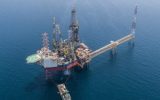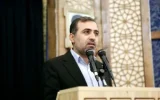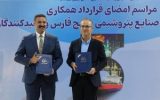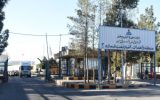
The deputy minister of oil said: With the registration of a historical record in liquid fuel delivery to power plants in December, the power plant fuel reserves reached an optimal condition, and this very fact led to no planned power outages in the country during the peak of the cold season.

Mantro stated at the European Parliament meeting with the EU's Foreign Policy Chief, Kajsa Kallas, that Trump is after Iran's oil.

The project manager of Phase 11 in South Pars announced: With the completion and commissioning of the tenth development well in Phase 11 of South Pars, the daily production of rich gas has increased by more than 2 million cubic meters.

The energy optimization manager of the National Petrochemical Industries Company announced the increase in the participation of gas subscribers in the "10% energy consumption reduction" campaign and said: "This plan is a five-year roadmap for resilience; a trust that has been placed in the hands of the people with the cooperation of petrochemical companies and is being implemented with full stewardship, transparency, and supervision."

The SPD11A phase 11 South Pars jacket has been successfully installed and is ready to start drilling operations for 15 wells in this border phase. This project showcases Iran's national engineering capabilities and project management.

The Secretary of the Supreme Selection Council of the country, appreciating the achievements of the Central Selection Committee of Oil, announced: Many national innovations in the field of selection, including the online system and the use of artificial intelligence for wise selection, have been designed and implemented for the first time in the selection of the Ministry of Oil, and this set has become a leading model for the entire country.

The spokesperson for the Energy Commission and the representative of Shiraz and Zarqan in the Islamic Council of Experts, referring to the formation of the Energy Optimization and Strategic Management Organization and the establishment of an account in this regard, announced that no deposits have been made to this in the past three years.

The Petrochemical Company of Khuzestan and Raymond Suren Part Company signed a cooperation contract to construct mechanical silos for the Petrochemical Complex of Khuzestan.

A one-day documentary on the Minister of Oil's visit to Asaloueh and Jam will be broadcast on Channel One today.

The manager of the National Petroleum Products Distribution Company in the Zahdan region announced the widespread distribution of white oil in the area, stating: So far, 230 million liters of white oil have been distributed in this region, and white oil has been allocated two batches of 300 liters cold season storage.










